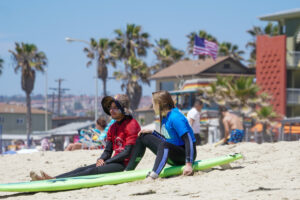It’s been a long discussion around the question: should surfing be included in the Olympic Games? The so-called purists of the sport have often showed antipathy towards the idea; the progressivists embraced and supported it. Olympic sports are all anchored around fairness and level playing fields, but the ocean doesn’t offer that. The only way surfing would ever be considered an Olympic sport is if it was held in wave pools, but if it was held in wave pools then wouldn’t we consider it surfing? New technology aside, the notion of surfing molding itself to the principles of the Olympic games raises plenty of questions. There are the issues of fairness, regulations, and well, if we really want to quantify wave riding more than they already are.
The number of Olympic Games sports has grown from nine at the first Olympic Games in 1896, to 28 to be contested at the Rio Olympics in 2016, with more sports always keen to get into this exclusive list. Sports come in and out of vogue around the world over time, and in order to continue to be relevant to the world of sport, the Olympic Games needs to adapt with these changes. There are always sports on the fringe of being selected into the Games, and those that only stay in due to being a traditional part of the Games.
To make it onto the Olympic program, a sport first has to be recognized: it must be administered by an International Federation which ensures that the sport’s activities follow the Olympic Charter. If it is widely practiced around the world and meets a number of criteria established by the IOC session, a recognized sport may be added to the Olympic program on the recommendation of the IOC’s Olympic Program Commission. According to Chapter 5, Section III of the Olympic charter, every edition of the Olympics must include all “core” sports. These core sports are chosen by the Session upon proposal by the IOC Executive Board. In the summer, they must include at least 25 of the sports governed.
The Olympic Committee also recognizes a number of other sports; the committee session at which the host city is selected can also specify that some of these sports are to be included in that edition of the games, but only up to a maximum of 28 sports (which gives quite a bit of leeway in the winter games). For a sport’s governing body to be recognized and hence be eligible for inclusion in the games, it must be in compliance with the World Anti-Doping Code; but the final decision rests solely with the committee as determined by a vote. Baseball and softball have been removed from the games as of the 2012 edition; this opens up two slots. Those slots will be filled by golf and rugby sevens in the 2016 games, bringing the total back to the maximum 28.
Besides Surf, Softball, baseball, karate, squash, roller sports, wushu, wakeboard and sports climbing: disputes to be included on the sports program of the 2020 Games. The decision will be made at the 125th IOC Session in Buenos Aires in 2013. This list was approved by the Executive Board before the 123rd IOC Session held in Durban, South Africa, in July 2011. On September 28 2015, the shortlist was reduced to five sports – baseball and softball, karate, roller sports, sport climbing and surfing (leaving out bowling, squash and wushu). These sports have been recommended for inclusion on the Olympic program at Tokyo 2020. Final confirmation is expected to be made at the IOC Session in Rio de Janeiro in August 2016, with no details on exactly how many sports will be added.
With Surfing, it was a long road… The treacherous adventure into the Olympic movement started in 1992 when former ISA leader Jacques Hele started lobbying for surfing in the international sports event and in the last 20 years, surfers lost five Olympic bids. On the last June of 2015, the International Surfing Association announced it had submitted a formal application to include a surfing event at the Tokyo 2020 Olympic Games. Surfing joins joined the others sports cited as potential additions for the 2020 summer games. However, the biggest winner here is clearly Fernando Aguerre, the president of the International Surfing Association (ISA), that has been fighting for the inclusion of surfing in the Olympic Games for more than a decade. His arguments are valid and understandable:
“Surfing is truly a global sport, more popular and more widely practiced than many current Olympic sports. Surfing is pursued in every corner of the world, in more than a hundred countries. There are now over 35 million surfers worldwide! Surfers are a strong and positive influence on young people around the world. They are a very relevant part of our youth culture and serve as inspirational figures, naturally representing Olympic values.”, wrote Aguerre.
If surfing is to ever become an Olympic sport, then of course it will take wave pools to get it there. With only a few nations lucky enough to have coastlines with consistent, well-formed surf, it can only happen globally when all nations have the same opportunity to learn and compete. For surfing to finally reach the Olympics would be an achievement, but to succeed on the long term the standard of the waves is absolutely critical. If the waves standard is too low, then the first time may very well be the last time. This must be avoided by assessing and comparing, in great detail, all of the wave making options. Aguerre has always supported wave-making technologies as a natural path towards the Olympic Games. The ISA boss believes that surf pools will “provide opportunities for the integration of diverse socioeconomic, ethnic, religious, and age groups long after the Games have moved on.”
Another supporting of this idea, the surfing icon Kelly Slater (11 times surf world champion) has been developing his mysterious artificial wave for the last decade, and last December 2015 stunned the surfing world with by showing off his secret spot, a huge pool that can produce “elite-level” waves repeatedly. It would be hard to fathom just how much time surfers have collectively spent watching and re-watching the video of Kelly Slater surfing his perfect artificial peeler. At this point, we probably have every turn, barrel, and air committed to memory. And it’s not at all surprising that the video has resonated so much with surfers. They’ve all dreamt of a future when man-made waves could be built to their lofty standards of perfection, and now it is happening!
In another hand, the president of the governing body for the sport of surfing has a final word for the purists: “I don’t believe that the soul of surfing requires it to be an elite sport for the lucky few who live near the ocean’s waves.” To get a general consensus on the topic, the Surf specialized website “Surfer”, asked a handful of surfers, writers, and editors to share their opinions the last time this was in the news, in 2012. The question remains: Should surfing be an Olympic sport? And here are the answers:
Taylor Knox, Veteran World Tour Surfer:
“Surfing should be an Olympic Sport for sure. We surf against the best surfers from countries around the world on the ASP. It would be unreal competing alongside Kelly Slater against friends like Mick Fanning, while representing the U.S.A. Now more than ever there are many countries with talented surfers. Signs point to continuing in this direction. It would be hard to have the event when the hosting city is land locked, but with the way technology is going it seems we will be able to bring world class waves and surfing anywhere.”
Sean Doherty, SURFER Senior Writer:
“No, no and err…no. Olympic sports are all anchored around fairness and level playing fields, but the ocean doesn’t offer that. The only way surfing would ever be considered an Olympic sport is if it was held in wave pools, and if it was held in wave pools then I wouldn’t consider it surfing. The fact that no two waves are ever the same is what makes surfing, surfing. It’s not designed to be fair. The ocean isn’t fair, and unless you’re Kelly the ocean really doesn’t give a shit about you.”
Matt Warshaw, SURFER Historian:
“Thought I was done being pissed off over the 100-year mainstreaming of this wonderful sport. Thought I was old enough, and far away enough from Orange County, to not much care. But the thought of surfing in the Olympics brings a familiar dab of bile to my throat. Can we just all agree to pretend, for a little while longer, that surfing is a unique thing to do? That this difference has in fact always been its strength?”
Gabriel Medina, 2014 World Champ:
“Yes, I think surfing should be included, and I would absolutely love to surf in the Olympics. It would be such a great honor to represent my country. Plus, it would be a sick competition with the Brazilians teaming together against the other counties. And of course we would win. Haha! Hopefully it will happen.”
Dave Prodan, ASP International Media Manager:
“Personally, I’m a big fan of the Olympics and enjoy any activity that pits nations against one another in friendly competition. However, I am torn on whether or not surfing is an appropriate fit for it. I absolutely think the athleticism performed by surfers qualifies it as a worthy activity, but the lack of a static playing field would be a challenge to hosting a worthy event in some nations and a virtual impossibility in others.”
Damien Hobgood, Veteran World Tour Surfer:
“This may sound like a selfish or a bad thing, but I’ve never really been that into seeing surfing in the Olympics. I love the Olympics, but for some reason seeing surfing as part of that hasn’t ever really been something that I’ve felt very strongly about. I’m sure that there are a lot of kids out there who dream about surfing in the Olympics, and I think that’s great, but it’s not something I’m particularly passionate about. I love the idea of representing my country, but I feel like I do that anyway right now.”
Looks like there is still a long way ahead and a lot of discussion to do, once even the professionals on the sport aren’t able to conclude the best way to go. If surfing were to be included in the Olympics, the big question will be if it would change the sport at all. Looking at snowboarding for a future view of what surfing could look like, as part of the Olympics, we cannot perceive nothing that surfing needs to change to become part of the Games.
The point is this technology will be available at a reasonable cost in the very near future. How is it going to be the use by surfers that will reveal scenes of the next chapters. But what is more interesting is the fact that in this scenario, we are playing with all different aspects to treat the same theme, technology versus nature, tradition versus new, sports versus lifestyle, Olympic Games or no, who is going to win? We have to wait until the final confirmation that is expected to be made at the IOC Session in Rio de Janeiro in August 2016, until then, the discussion continues. Which side are you on?
References:
https://www.surfermag.com/features/should-surfing-be-in-the-olympics/#TAJ6IABPDuR7sqqW.97
https://www.surfertoday.com/surfing/12213-surfing-included-in-the-tokyo-2020-olympic-games
https://www.thedailybeast.com/articles/2015/10/11/the-olympics-made-surfing-lame-somehow.html
https://www.surfermag.com/features/should-surfing-be-in-the-olympics/#w3iXdzesGEBMVl5K.99
https://stillmed.olympic.org/Documents/olympic_charter_en.pdf
https://www.surfermag.com/features/kelly-slater-man-made/#JRc1waO5KgCDcEpT.99




